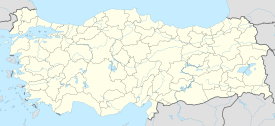Elaeus
| Ἐλεοῦς | |

Elaeus and the Hellespont
|
|
| Location | Seddülbahir, Çanakkale Province, Turkey |
|---|---|
| Region | Thracian Chersonese |
| Coordinates | 40°3′35″N 26°13′50″E / 40.05972°N 26.23056°ECoordinates: 40°3′35″N 26°13′50″E / 40.05972°N 26.23056°E |
| Type | Settlement |
| History | |
| Builder | Colonists from Teos |
Elaeus (Ancient Greek: Ἐλαιοῦς Elaious, later Ἐλεοῦς Elaeus), the “Olive City”, was an ancient Greek city located in Thrace, on the Thracian Chersonese. Elaeus was located at the southern end of the Hellespont (now the Dardanelles) near the southernmost point of the Thracian Chersonese (now the Gallipoli peninsula) in modern-day Turkey. According to the geographer Scymnus, Elaeus was founded by settlers from Ionian Teos.
The most important cities of the Chersonese were Lysimachia, Pactya, Gelibolu, Alokopennesos, Sestos, Madytos and Elaeus. The peninsula was renowned for its wheat. It also profited from its strategic location on the main trade route between Europe and Asia, as well as the possibility of controlling shipping to Crimea. For these reasons, Elaeus later received colonists from Athens, who built fortifications there.
The last resting place of the mythological hero Protesilaus was said to be at Elaeus, near a steep coastal cliff. According to Homer’s Iliad, Protesilaus was the first Greek to set foot on land during the Trojan War, for which - according to the will of the gods - he was also the first to die. His tomb at Elaeus lay on the European coast opposite Troy, and became a destination for pilgrimages by members of the cult of Protesilaus. Later, the temple housed votive offerings, and was surrounded by a settlement. In antiquity, the location was variously under Athenian, Persian, Spartan and later Macedonian control.
...
Wikipedia

